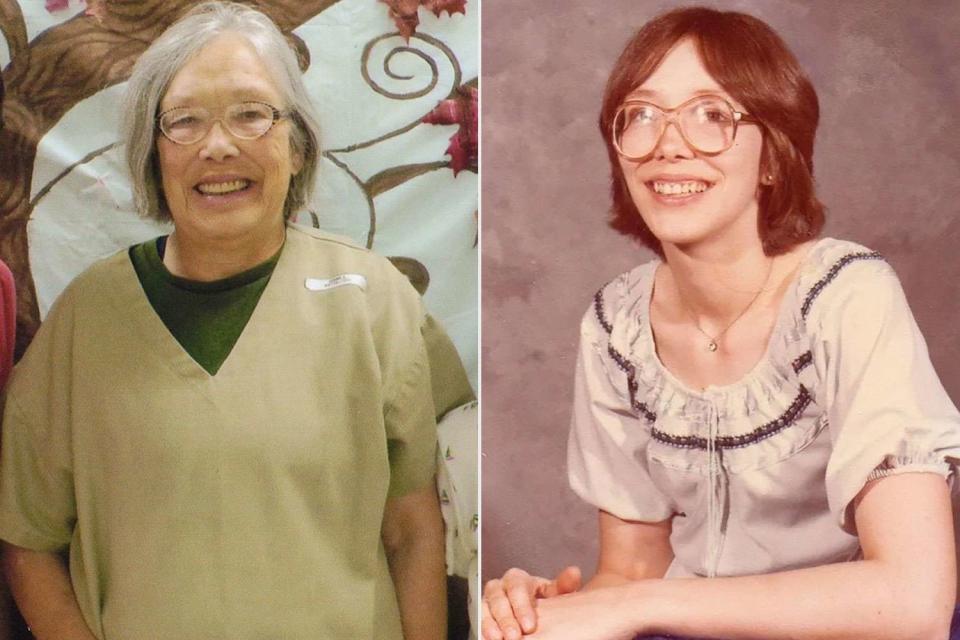Woman's Conviction for 1980 Murder Is Overturned — and Judge Believes Cop Did It
The judge called Sandra Hemme — incarcerated for 43 years and still behind bars — "the victim of a manifest injustice"

Courtesy of the Hemme family
Sandra Hemme in a recent photograph (left) and around the time of the 1980 murder (right).Sandra Hemme has spent more of her life behind bars than outside them. But a circuit court judge in Missouri now says the woman, who suffers from mental illness, should have never been incarcerated – and that a now-deceased local police officer was never properly investigated and should have likely instead been charged with the 1980 killing.
Judge Ryan W. Horsman overturned Hemme’s capital murder conviction in a Friday, June 14, order obtained by PEOPLE, calling the 64-year-old woman who has spent the last 43 years in prison “the victim of a manifest injustice.”
“It would be difficult to imagine that the State could prove Ms. Hemme’s guilt beyond a reasonable doubt,” the judge wrote in his decision adding that he found her “innocence to be clear and convincing.”
If exonerated, Hemme would be the longest serving woman known to be wrongfully convicted in U.S. history, Jane Pucher, Hemme’s Innocence Project lawyer tells PEOPLE.

Courtesy of the Hemme family
Sandra Hemme (center) with her sister (left) and mother (right).There was no motive for Hemme to kill Patricia Jeschke, a St. Joseph, Mo., librarian, according to the judge. (Pucher says the two women had likely never even met.)
There were no witnesses claiming Hemme was at the scene of the crime, and there was no forensic evidence tying her to the brutal murder, per the 118-page order, which went on to say: “In fact, everything that was forensically tested excluded her.”
The only thing prosecutors had when they convinced a jury of her guilt was the woman’s confession, which her lawyers have called in court documents “wildly contradictory, uncorroborated, and factually impossible.”
Investigators' intensive questioning began at St. Joseph State Hospital, where she was “so heavily medicated that she was unable to even hold her head up and was restrained and strapped to a chair,” according to the Innocence Project, who took up her case decades after Hemme confessed.
The judge ruled last week that her “inconsistent, disproven” confession, made “while she was in psychiatric crisis and physical pain,” is “the only evidence linking Ms. Hemme to the crime.”

Courtesy of the Hemme family
Sandra Hemme, circa 1980.Want to keep up with the latest crime coverage? Sign up for PEOPLE's free True Crime newsletter for breaking crime news, ongoing trial coverage, and details of intriguing unsolved cases.
But there was someone in town – a St. Joseph police officer – who the judge says was never properly investigated, despite what the judge called “substantial and objective” evidence against him.
Michael Holman had in his possession Jeschke’s distinctive wishbone earrings, as well as her credit card – attempting a $630.43 charge for photography equipment – the day investigators found her body. Hairs at the crime scene were also “consistent with his own,” per the judge.
The jury was aware of the credit card and the hairs– but they were not told about her earrings, or about the young officer’s “extensive” criminal behavior, which the judge noted included “repeated home burglaries, crimes of dishonesty, and stalking offenses.”
Numerous witnesses reported seeing Holman’s pickup truck near Jeschke’s home the evening she was killed, and while Holman eventually admitted he was in the area around the time of her murder, his explanation for why was ultimately determined to be a lie – “all of which the jury did not hear,” the judge said in his order.
Holman, who died in 2015, was never charged with Jeschke’s murder. The judge said his fellow officers “failed to seriously investigate Holman as a suspect.”
Instead, police returned to St. Joseph State Hospital – where the year before they had secured a conviction against another psychiatric patient after coercing a confession from 24-year-old Melvin Lee Reynolds, who was later exonerated, per the Innocence Project. Some of the same officers also took on Hemme’s case.
As recently as January, the Missouri Attorney General’s office argued to uphold Hemme’s conviction.
But even agreeing to such an evidentiary hearing in an innocence case is rare in Missouri, The Kansas City Star previously reported.
Also in the state, Kevin Strickland was similarly incarcerated for 43 years, before he was ultimately exonerated in 2021 of a triple homicide in Kansas City, Mo. The former attorney general opposed Strickland’s exoneration efforts, as well as that of Lamar Johnson, of St. Louis, Mo., per the newspaper. Johnson spent 28 years behind bars before his conviction was overturned.
The judge has ordered that Hemme — who remains in custody at Chillicothe Correctional Center per her online incarceration records — be released within 30 days of his order unless prosecutors go to trial within that timeframe.
Missouri’s Attorney General Andrew Bailey did not respond by email or text confirming if prosecutors plan to retry the case.
For more People news, make sure to sign up for our newsletter!
Read the original article on People.


